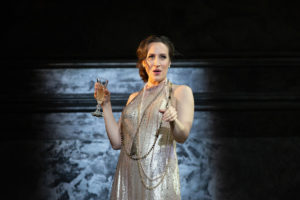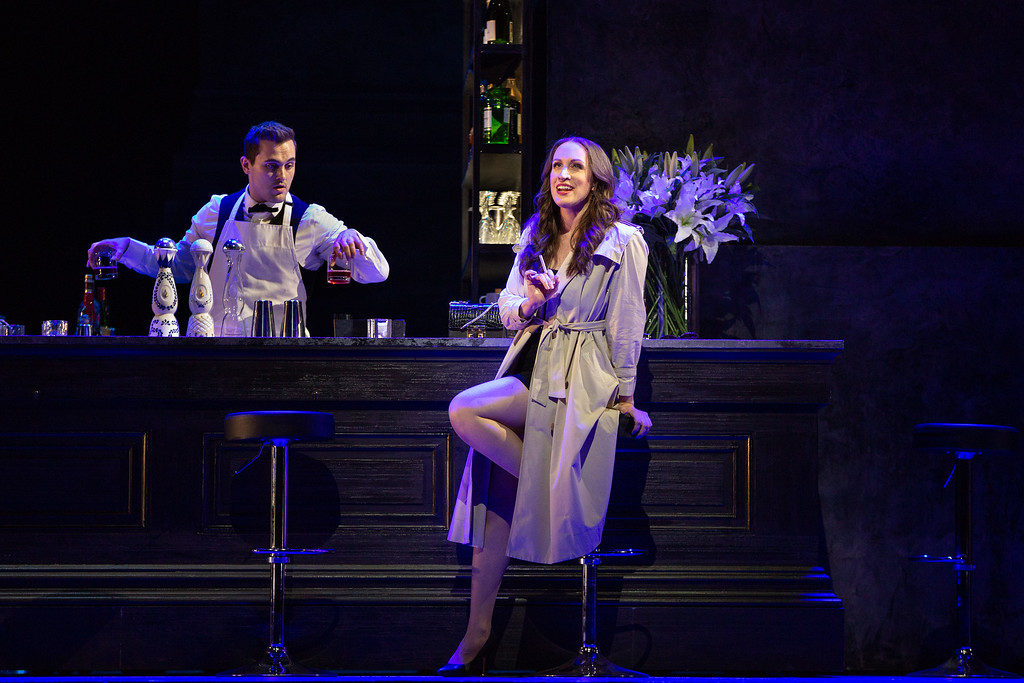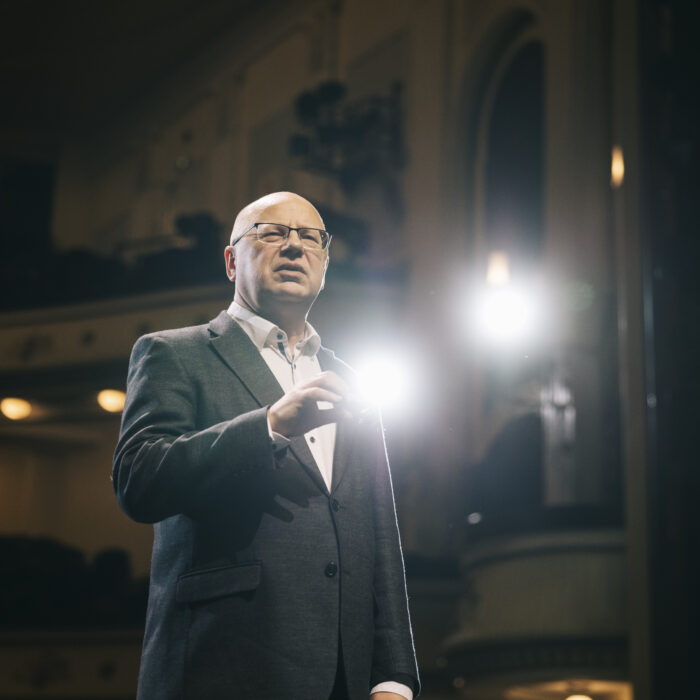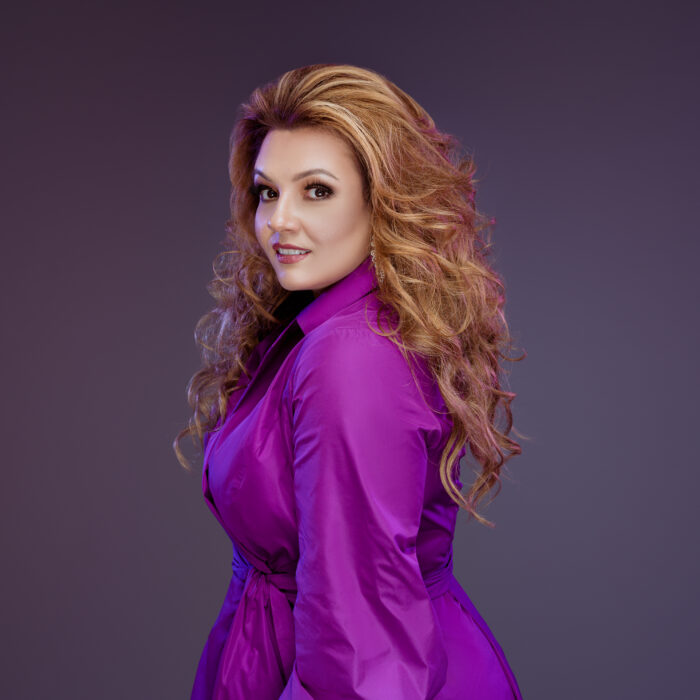
Alexis Rose to Stormy Daniels – How Brenda Rae Draws from Contemporary References in ‘Agrippina’
By Arya RoshanianDebuting at the Metropolitan Opera is a hard gig to come by, especially when it’s a principal role in a new production in an opera that’s never even been performed on the Met stage. But after a decade of singing leading roles all over the world, American soprano Brenda Rae is readier than ever to tackle New York’s biggest stage, alongside operas most famous stars.
Last week, Rae made her long-awaited Met debut in David McVicar’s production of Handel’s “Agrippina,” which the company presented for the first time ever in its 140-year history. Her performance as the charming yet cunning Poppea has already garnered acclaim, with OperaWire writing in its review that Rae sang “with sweet and poised sound” and “spun an endless series of fiery coloratura, each one more intense than the last.” She also received one of the biggest ovations of the evening during the curtain call. All in all, one couldn’t ask for a better debut.
Handling Handel
The Wisconsin native is no stranger to Handel. Already in her repertoire is Armida in “Rinaldo,” which Rae performed to great acclaim at the Glyndebourne Festival in 2011, as well as the title role in “Semele,” which she most recently sang last year in Paris. Though Rae has a proclivity for the music of Baroque composers like Handel, her repertoire ranges across the board, from bel canto to Bernstein, and even “Zauberflöte” to “Zwerg.”
She is able to navigate different styles without it having negative effects to her voice. She does, however, need to give those intricate Handelian melismas extra TLC.
“Handel coloratura is so different from coloratura in, let’s say, bel canto, and I have to adjust to that,” Rae told OperaWire shortly after her big debut. “I need to spend some extra learning time to ensure that those patterns are not only in my voice, but more so in my brain. As long as my brain knows those patterns, my voice can just take over.”
Rae is used to that kind of hard work – everything she’s accomplished in this industry has been done on her own. Originally from Appleton, Wisconsin, Rae’s family grew up with an appreciation for arts, though none were professional musicians. No one pushed her to pursue music, either – it was something she very much wanted to do on her own.
And opera was never her only passion, having also explored pop, jazz and even songwriting. As had what she describes as a “big cauldron of music” in front of her, and it was that kind of freedom that allowed Rae to focus on opera without it ever feeling forced.
And those hours studying sheet music and scores was worth it.
After receiving performance degrees from University of Wisconsin – Madison and The Juilliard School, her career took off. She found early success in Germany when joining the Ensemble at Oper Frankfurt, adding role after role to what is now a reliable laundry list of characters.
It was in Frankfurt where she sang one of her first Handel roles on a professional stage – Cleopatra in “Giulio Cesare,” one of his most performed operas. But “Agrippina” doesn’t have that same recognition, as audiences are not as familiar with Handel’s earlier works. In some ways this is helpful to Rae, as she doesn’t have any expectations to live up to.
“For my debut, to have the freedom with this role that I wouldnt with, let’s say, ‘Lucia [di Lammermoor]’,” Rae said, drawing contrasts with roles more commonly associated with Met repertoire. “I don’t have to worry about the last person that portrayed it. The audience doesn’t have that perception of Poppea yet.”
She added: “I always try to focus on my own characterization of whatever character I’m singing, and not worry about the tradition. Of course, it’s always in the back of your head, especially when you’re singing in a house with as big a tradition as the Met. But I’m having so much fun with this role. It’s like a bowl full of candy for me.”

(Credit: Marty Sohl)
Becoming Poppea
Poppea is flirty, sometimes silly, but no less intelligent or guileful. Though she and Ottone are in love, Agrippina tricks Poppea into thinking that he has betrayed her. But when Poppea realizes she’s been deceived by Agrippina, she flips the narrative and rights her own wrongs.
Like Agrippina, she uses her sexuality to her advantage, but ultimately doesn’t abuse that power (at least not in “Agrippina”). Rae described Poppea as possessing a lot of heart. She’s not as conniving or manipulative like Agrippina, but she’s not innocent either.
“The cast has talked a lot about how Poppea learns a lot by watching the way Agrippina works. She’s aware of the power of her own sexuality, and uses that to her advantage,” Rae noted. “She knows what she has to get into a position of power, which we see not in this opera but later in history. But we get a glimpse of it.”
There has been much support from her colleagues as well. Though she’s debuting alongside longtime Met favorite Joyce DiDonato, Rae pointed out that there are no egos in the rehearsal room. Everyone is intent on creating art together, as equals.
“There is such a great feeling when I walk into the rehearsal room. We’re all there to serve the story and characters and we all have the same goal in mind. We’re all working together. And to have a director [McVicar] who knows the text as well as he does, and still gives us the freedom to create the characters as our own, is a blessing. He’s done this opera before, but he’s open to working with the strengths of his cast. Our production is so witty and biting, and it’s great to have a director like him to help me figure out this character.”
Rae cited Alexis Rose from the TV show “Schitt’s Creek” as one of her inspirations for the role. And that’s not the only contemporary reference she’s drawing from.
Her cast mates were quick to point out the similarities between Poppea and Stormy Daniels, the adult film actress who was paid-off to keep her affair with President Donald Trump quiet. Many of the opera’s plot points could be plucked from today’s news headlines, something that’s also been a topic of conversation among the cast. Opera, among all art, has always been used as a vessel for political commentary. And with similarities to today’s political climate, Rae pointed out that the plot “Agrippina” is timeless.
“There are always people who will lie to get into power. And we don’t know what the truth is, because people are playing games. But they’ll do anything to rise to the top. That’s true in politics, and that’s what this opera is all about.”


